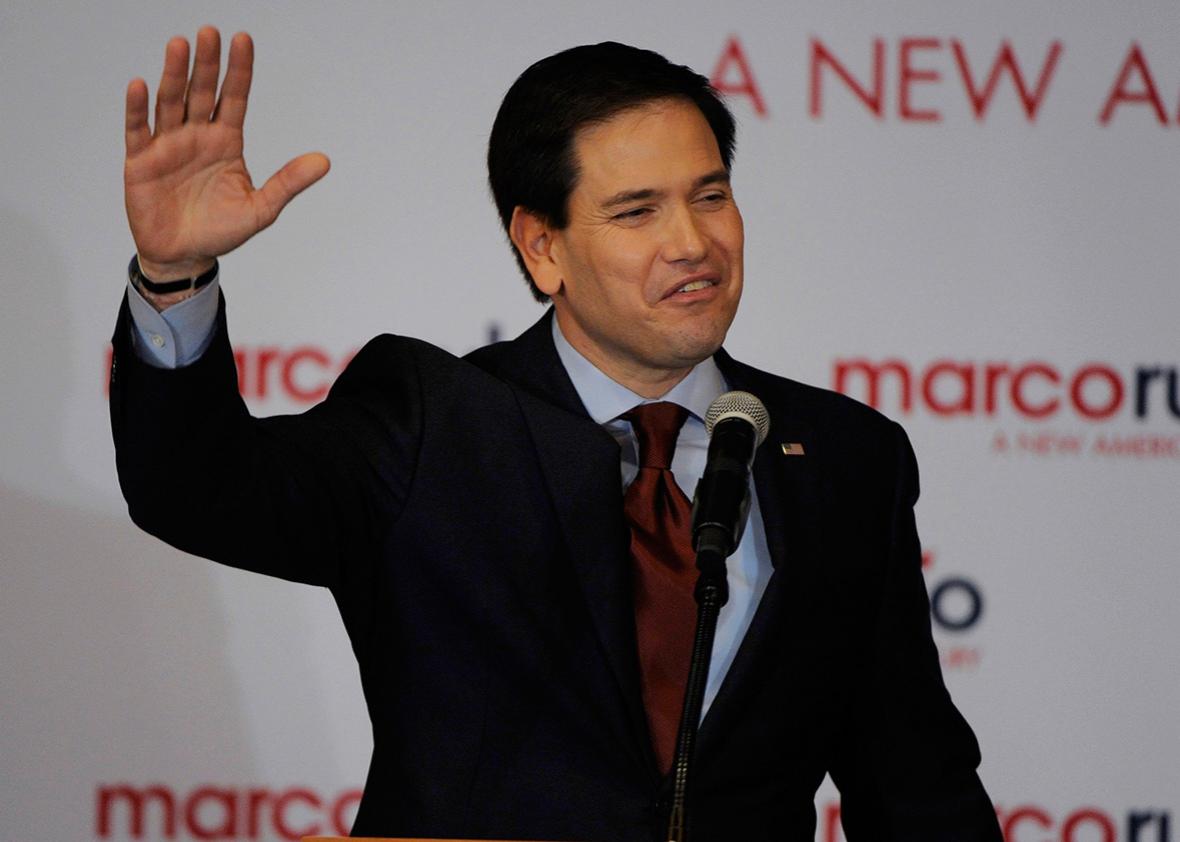When distilled through the tedious game of expectations management and how that plays out on cable news, you would think that Sen. Marco Rubio just won the Iowa caucuses with the support of roughly 96.4 percent of caucus-goers. Rubio himself was very much playing up that impression in his, er, “victory” speech, which he wisely delivered before any of the two rivals who bested him had the opportunity to speak.
“So this is the moment they said would never happen,” he said, grinning, referring to the third-place finish that most people had been predicting for several months. “For months, for months they told us we had no chance.” Yup, and he didn’t. “But tonight, tonight here in Iowa, the people of this great state have sent a very clear message: After seven years of Barack Obama, we are not waiting any longer to take our country back.” Well, sure, Iowa Republicans are definitely interested in electing a Republican to replace President Obama.
Rubio finished third place in the Iowa caucuses, behind Donald Trump and Sen. Ted Cruz. He is not—repeat, not—president-for-life of the United States of America and its territories just yet. The candidate who looks like a considerably better bet to be the Republican nominee after tonight is the guy who came from behind to win the Iowa caucuses, Cruz. And though he suffered a humbling defeat, Trump still heads into New Hampshire and South Carolina with significant polling leads, and in primary states that don’t have such a convoluted voting process.
What did Rubio do for himself, though? Plenty. He exceeded expectations through a modest surge over the past week, largely among moderate Republicans in suburban Iowa, coming a few thousand votes from pulling off an upset second-place finish. That’s a strong enough signal to the center-right and the “establishment”—aka that nefarious group of Republican cigar-chomping devils who would like a Republican to have a fighting shot in the general election—that he’s their vehicle, and all pretenders had better step aside.
Barring some coordinated trolling effort from New Hampshire voters who like to mess with narratives—and they are capable of it—Rubio’s better-than-expected placement opens the exit door for Jeb Bush, Gov. Chris Christie, and Gov. John Kasich immediately after New Hampshire, and it pulls what should be a frightening amount of funds and official party support in Rubio’s direction. The longer the crowded “establishment lane” battle went on, the easier it would be for either Cruz or Trump to prevail. It now doesn’t look like that battle will extend South of the Mason-Dixon line, although Bush—whose super PAC spent tens of millions of dollars in Iowa just to prevent Rubio from having the exact finish he had tonight—may choose to play stubborn for a while.
And yet. How much space is there in the establishment lane, still? And how many people are willing to follow behind party leaders when they still have Cruz or Trump to line up behind?
We’ll have to wait for new polls to come in to show how fully Rubio shattered the world following his bronze-medal finish—sorry, strong bronze-medal finish—in the Iowa caucuses. These things can shake up quickly. But consider how much space South Carolina has for the top establishment candidates according to the RealClearPolitics polling average: Rubio, Bush, Kasich, and Christie earn a combined 27 percent. That ain’t much, and it’s not going to be much better throughout the Southern sweep that follows on March 1. If Rubio is going to win the nomination, his path would still rely heavily on the back-end of the primary schedule and its moderate, winner-take-all states.
Rubio did not win tonight. But he did well enough to clear up the center-right and begin corralling a significant chunk of the party behind his candidacy, which had been showing a frustrating inability to take off.
